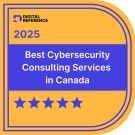How vCISO's approach AI Security Risks
The Virtual CISO's Guide to AI Security Risks: Protecting Your Organization's Artificial Intelligence
The Rise of the Virtual CISO
In today's rapidly evolving business landscape, artificial intelligence has become more than just a buzzword—it's a fundamental part of how modern organizations operate. But with this technological revolution comes a new set of security challenges that keep security leaders awake at night. Traditional cybersecurity measures, while still important, aren't enough to fully protect AI systems from emerging threats. A Virtual Chief Information Security Officer (vCISO) offers expert guidance without the overhead of a full-time executive, helping organizations to proactively manage and mitigate AI-related risks.
Think of a vCISO as your organization's security guardian angel—always watching, advising, and protecting, but without the overhead of a full-time executive. These seasoned security professionals bring the same expertise as traditional CISOs but offer something extra: flexibility and cost-effectiveness that many organizations, especially those in their growth phase, find invaluable.
When a vCISO joins your team, they become a strategic partner in your security journey. They don't just sit in meetings and write policies—they roll up their sleeves and work alongside your internal teams, helping to craft and implement security strategies that protect your organization's crown jewels: your information assets.
The AI Security Challenge
Imagine training an AI model that's crucial to your business operations. Now imagine that model being attacked in ways you never considered possible. This isn't science fiction—it's the reality of AI security risks. Let's explore some of the most critical threats:
Adversarial attacks are like optical illusions for AI systems. Just as our eyes can be tricked by clever visual manipulations, AI models can be fooled by carefully crafted inputs. A slight modification to an image, imperceptible to human eyes, might cause an AI system to completely misclassify what it's seeing.
Data poisoning is equally insidious. Picture someone secretly adding contaminated ingredients to a recipe while you're cooking—the final dish won't turn out as intended. Similarly, when malicious data is introduced during AI training, the resulting model can be corrupted from the inside out.
Model theft and inversion attacks are like corporate espionage in the AI age. Attackers might try to steal your AI models to extract your proprietary algorithms or, worse, reverse engineer them to access sensitive training data.
The Business Impact
These threats aren't just theoretical—they can have real and devastating consequences. When AI systems fail due to security breaches, the domino effect can be remarkable. Critical business processes grind to a halt. Financial losses mount, both from direct theft and regulatory fines. Customer trust, built over years, can evaporate in moments. Legal consequences may follow, especially if the organization wasn't compliant with data protection laws.
How vCISOs Turn the Tide
This is where vCISOs prove their worth. They bring a structured, comprehensive approach to AI security that combines strategic thinking with practical implementation. Their process typically unfolds in several key phases:
First comes the detective work—thorough risk assessments that uncover potential vulnerabilities in AI systems. Like a skilled investigator, a vCISO examines your AI architecture from every angle, identifying where threats might emerge and which vulnerabilities could be exploited.
Next is the architectural phase. Your vCISO will help implement robust security frameworks, including zero-trust architecture—a security model that operates on the principle of "never trust, always verify." Think of it as having a strict bouncer at every door of your AI system, checking credentials before allowing anyone or anything to pass.
Education plays a crucial role too. The best security technology in the world won't help if your team doesn't know how to use it properly. vCISOs develop comprehensive training programs that turn your employees into the first line of defence against AI security threats.
Finally, there's the infrastructure piece. Your AI systems need a secure foundation, whether they're running on-premises or in the cloud. This includes implementing endpoint protection platforms to secure devices and servers, and robust cloud security measures to protect your AI applications in cloud environments.

The Strategic Role of vCISOs in AI Security: A Modern Safeguarding Approach
Picture a world where artificial intelligence powers crucial business operations across industries. Now, imagine the responsibility of protecting these sophisticated systems from evolving cyber threats. This is where a Virtual Chief Information Security Officer (vCISO) becomes an organization's greatest ally in maintaining robust AI security.
The Watchful Guardian: Continuous Monitoring and Analytics
Think of a vCISO as a vigilant guardian, constantly watching over your AI systems through sophisticated monitoring tools. Like a security camera system for your digital assets, Security Information and Event Management (SIEM) systems collect and analyze vast amounts of log data, searching for signs of suspicious activity. These systems work tirelessly in the background, much like a sophisticated home security system that alerts you to potential intruders.
But monitoring goes beyond simple observation. Modern anomaly detection tools, powered by AI themselves, act as intelligent sentinels that can spot the slightest deviation from normal patterns. It's similar to having a seasoned detective who knows exactly when something doesn't quite fit the usual pattern.
Regular security audits complement these automated systems, much like periodic health check-ups ensure your overall wellbeing. These reviews help maintain system hygiene and ensure all security measures remain effective and compliant with current standards.
The Emergency Response Architect: Preparing for the Unexpected
In the world of AI security, being prepared for incidents is as crucial as preventing them. A vCISO architects a comprehensive incident response strategy that works like a well-oiled emergency response system. They assemble cross-functional teams, similar to how emergency services coordinate police, firefighters, and paramedics for different types of crises.
These teams follow carefully crafted playbooks – think of them as detailed emergency protocols that guide responses to various AI-related incidents. After each incident, just as medical professionals conduct post-operation reviews, the team analyzes what happened and how to improve future responses.
The Intelligence Officer: Staying Ahead of Threats
Information is power in the cybersecurity world. vCISOs serve as intelligence officers, constantly gathering and analyzing information about new threats and vulnerabilities. They tap into threat intelligence feeds, participate in security information-sharing networks, and stay current with the latest security research.
This approach is similar to how meteorologists use various data sources to forecast weather patterns – by collecting and analyzing data from multiple sources, vCISOs can better predict and prepare for potential security threats.
Why Choose a vCISO?
Engaging a vCISO is like having a seasoned security consultant on speed dial. They bring specialized expertise in AI security without the overhead of a full-time executive. Their strategies are customized to your organization's unique needs, much like a tailored suit fits better than off-the-rack options.
As your organization grows, a vCISO's services can scale accordingly. They help navigate the complex maze of AI-related regulations and data protection requirements, ensuring your organization stays compliant while maintaining robust security measures.
Just as a lighthouse guides ships safely through treacherous waters, a vCISO guides organizations through the complex and ever-changing landscape of AI security. Their expertise, combined with modern tools and strategies, helps organizations harness the power of AI while keeping their systems and data secure.
Conclusion
As AI continues to evolve, so too will the security challenges organizations face.. Having a vCISO on your team means staying ahead of these emerging threats. They bring not just technical expertise, but also the strategic vision to help your organization navigate the complex intersection of AI and security.
The journey to securing AI systems is ongoing, but with the right guidance from a vCISO, organizations can confidently embrace AI technologies while maintaining robust security postures. In this age of rapid technological advancement, that combination of innovation and security isn't just desirable—it's essential for survival and success. Subscribe to our Virtual CISO Services to learn more....
Our Industry Certifications
Our diverse industry experience and expertise in AI, Cybersecurity & Information Risk Management, Data Governance, Privacy and Data Protection Regulatory Compliance is endorsed by leading educational and industry certifications for the quality, value and cost-effective products and services we deliver to our clients.










